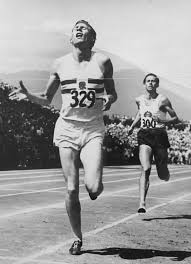On May 6th, 1954, on a make-do track field in Oxford, in windy and blustery conditions, medical student Roger Bannister broke what some thought was the unbreakable barrier of the four-minute mile. Paced for the first three-quarters by Chris Brasher – who was not so brash as to stop Bannister’s place in history – Bannister broke free for the last stretch, giving it his all, and crossed the finish line in 3 minutes and 59.4 seconds, to the thunderous cheer of the crowds. Since then, innumerable once-thought-unbeatable records have been broken – the current mile record stands at 3:43:13 by Hicham El Guerrouj on July 7, 1999. And the mile is regularly broken even at the high school level.
The hundred metre dash? Usain Bolt, with his natural physiognomy adapted to sprinting, has run it faster than perhaps any man ever will – 9.58 seconds in 2016. But who’s to say? One could go through the records – weightlifting, high and long jumping, swimming, cycling – and they keep getting broken, but the intervals are getting smaller and smaller, more and more, perhaps, asymptotic.
And by ‘asymptotic’, we mean that there may indeed be a limit, a point beyond which the unaided human body simply, by the sheer force of physical laws, cannot go. Race horses seem to have reached this limit, for after a certain speed, their legs would simply break. But what if their bones were made stronger?
If you’d like a scientific discussion of this question, and whether sports may soon reach its limit, peruse this article.
But if you’re fan of the ‘singularity’ – a proposed seamless harmony between man and machine, in both mind and body – then physiological limits don’t mean that much. But who wants to watch robots or cyborgs compete? The whole point is the striving of the human will, the spirit, mens supra materiam, mind over matter – that indefinable element in all sports, where the underdog may triumph over what seem impossible odds.
And the word ‘impossible’ does not seem to be included in the vocabulary of God. At least, we have authoritative testimony, and precedents, that it be so.

